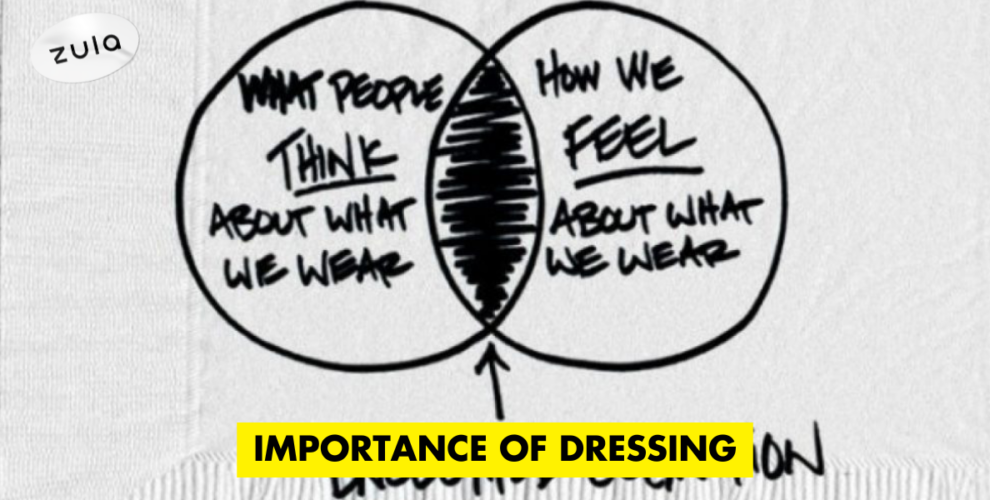The Importance of Dressing Up
It’s not groundbreaking news that your wardrobe says plenty about you. A brief glance through a rack or two will reveal your emotions, career interests, passions, and perhaps your ambitions.
As a fashion writer within the media industry, my wardrobe is stuffed to the brim with an eclectic range of clothes that span from the jarringly colourful to the quiet monotones. And there’s a good reason why.
Like it or not, psychologists have revealed that our clothing choices influence how others perceive us, how we view ourselves, and the way we think. I have a wide range of outfits so I have the creative freedom to play any role I want, for all occasions.
The question is not whether you care about fashion, but what you’re communicating intentionally or unconsciously through your fashion choices.
Contents
Our clothing choices influence the way others see us
Just like how Heath Ledger got into the Joker’s psychopathic mind frame by conceptualising his character’s makeup, the everyday person also plays their own chosen role on a daily basis.
A blazer can make you look reliable and rooted in tradition. This might be a coveted personality trait at an investment firm where trust with clients is needed. But it can also come off as stuffy and resistant to change, which may be unsuitable for a startup.
Did you ever notice former U.S. President Barack Obama’s attire when he addressed a crowd of working-class Americans? He often removed his jacket and rolled up his sleeves to silently indicate to the audience that he too was a hard worker like them.
Our clothing choices impact the way we think
By not putting in the time or effort to be presentable, you’re sending across a detrimental image.
The term ‘enclothed cognition’ describes the effect our clothes seem to have on psychological processes such as emotions, self-evaluations, attitudes, and interpersonal interactions.
Clothes affect our behaviours and moods because of the symbolic meaning that we ascribe to different types of attire; your clothes influence the way you feel.
By dressing in unfitting, stained clothes routinely, you’re probably unintentionally reinforcing your depressive moods.
In one experiment, researchers distributed standard white lab coats to participants and asked them to perform several tasks. Some were told they were wearing a ‘doctor’s coat’, while others had on a ‘painter’s smock’.
Those wearing the ‘painter’s smock’ were less careful and attentive than their counterparts; their actions were influenced by their clothing.
But, this doesn’t necessarily mean that dressing the same way reinforces a negative image. Having a personal uniform, à la Steve Jobs or Mark Zuckerberg, frees up time and mental energy that could’ve channelled to making better decisions at work.
A combination of simple basics that fit you well is all you need to look put together. Looking great doesn’t cost a bomb so leave that ballgown budget for your wedding day.
Also read:
16 Thrift Shops In Singapore For Secondhand Shopping Both Online & Offline
Practising enclothed cognition
But should you dress how you want to feel, or simply dress how you feel? Here are three rules to make enclothed cognition more effective.
1) Do it for yourself
Dressing to ‘fake it till you make it’ only work to a certain extent. You’ve got to work on your inner reality, self-talk, and actions to embody the qualities you want.
You might want to wear red to boost your confidence on a first date. But if you harp on your nervousness, that red dress isn’t gonna magically banish your stutter and shivering hands.
2) Have good self-awareness
You have to choose the right qualities to compensate for your inner need or lack. If you feel sad, you might think that being Miss Sunshine will lift your moods, when what you really need could be warm comfort.
That’s why you may feel inclined towards curling in an oversized sweater, as opposed to a grossly jarring flower print dress.
3) The disparity can’t be too large
You can’t dress in a way that veers too far off from how you’re really feeling. Only once you’ve determined the way you feel and are realistic about your expectations for self-improvement, then can you start considering your outfit choices accordingly.
If you feel profoundly sad, you may just have to wear unglamourous but comfy sweats on the couch for a day and heal yourself first.
And if you’re burned out from working long hours, taking a break might work better to increase your productivity than donning a business suit.
Dressing Up Isn’t All Just Fluff
So the next time you go on autopilot when you get dressed for the day, stop for a moment and consider your clothing choices.
Pick an outfit which will encourage others to see you in a more positive light, suppress anxiety and other negative feelings, inspire focus, and foster ambition.
Figure out your chosen role, and dress the part. You will be one step closer to the life you want, starting from your closet.
Cover image: Source
This article was first published on 30 August 2018 and last updated on 15 May 2024.
Also read:










